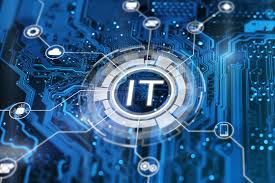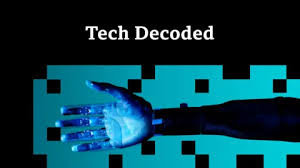The Latest in Information Technology
As we move further into the digital age, information technology continues to evolve at an unprecedented pace. From advancements in artificial intelligence to breakthroughs in quantum computing, the landscape of IT is constantly shifting. Here, we explore some of the most exciting developments that are shaping the future of technology.
Artificial Intelligence and Machine Learning
Artificial intelligence (AI) and machine learning (ML) remain at the forefront of technological innovation. Recent advancements have seen AI systems become more sophisticated, with applications ranging from natural language processing to autonomous vehicles. Companies are increasingly leveraging AI to enhance customer experiences, optimise operations, and drive new business models.
One notable development is the rise of generative AI models like GPT-4, which can generate human-like text and assist in creative tasks such as writing and design. These models are being used across various industries to automate processes and provide insights that were previously unattainable.
Quantum Computing
Quantum computing represents a revolutionary leap forward in computational power. Unlike classical computers that use bits as the smallest unit of data, quantum computers use qubits, which can exist in multiple states simultaneously. This allows them to solve complex problems much faster than traditional machines.
Recent breakthroughs in quantum technology have brought us closer to practical applications. Companies like IBM and Google are leading the charge with their development of quantum processors that could potentially transform fields such as cryptography, material science, and drug discovery.
5G Connectivity
The rollout of 5G networks is set to revolutionise connectivity across the globe. Offering significantly faster speeds and lower latency compared to its predecessors, 5G is poised to enable a new wave of technological innovation.
This enhanced connectivity will facilitate advancements in areas such as the Internet of Things (IoT), smart cities, and augmented reality (AR). Industries ranging from healthcare to manufacturing are expected to benefit from the increased efficiency and capabilities provided by 5G technology.
Cybersecurity Innovations
As technology advances, so do the threats posed by cybercriminals. In response, cybersecurity has become more sophisticated with innovations designed to protect sensitive information and systems from attacks.
Recent trends include the use of AI for threat detection and response automation. Additionally, there is a growing focus on zero-trust security models that assume no user or device can be trusted by default—requiring continuous verification throughout digital interactions.
Sustainability in IT
Sustainability has become a key consideration within information technology as companies strive to reduce their environmental impact. Efforts include developing energy-efficient data centres and promoting sustainable practices within tech supply chains.
The push towards greener IT solutions also involves leveraging technologies such as blockchain for transparent supply chain management and using AI for optimising energy consumption across various sectors.
Conclusion
The latest advancements in information technology promise exciting possibilities for both businesses and consumers alike. As these technologies continue to mature, they will undoubtedly reshape our world—offering new opportunities while also presenting challenges that must be addressed responsibly.
Exploring the Latest Innovations and Challenges in Information Technology: FAQs on AI, Quantum Computing, 5G, Cybersecurity, and Sustainability
- What are the latest trends in information technology?
- How is artificial intelligence impacting the tech industry?
- What is quantum computing and how does it work?
- What are the benefits of 5G technology?
- How can businesses leverage AI for growth and innovation?
- What cybersecurity measures should individuals and organisations implement?
- How is sustainability being integrated into information technology practices?
What are the latest trends in information technology?
Inquiring about the latest trends in information technology is a common query as the tech landscape is ever-evolving. Currently, some prominent trends include the rapid advancement of artificial intelligence and machine learning, the emergence of quantum computing for complex problem-solving, the widespread adoption of 5G technology for enhanced connectivity, the continuous innovation in cybersecurity to combat evolving threats, and the increasing focus on sustainability within IT practices. These trends collectively shape the future of technology and offer a glimpse into the transformative potential of ongoing technological developments.
How is artificial intelligence impacting the tech industry?
Artificial intelligence (AI) is significantly transforming the tech industry by driving innovation and efficiency across various sectors. It is enabling companies to automate routine tasks, thereby reducing operational costs and increasing productivity. AI-powered analytics provide businesses with deeper insights into consumer behaviour, allowing for more personalised and effective marketing strategies. In software development, AI tools are enhancing coding processes through automated testing and bug detection, leading to faster and more reliable software releases. Furthermore, AI’s integration with emerging technologies like IoT and 5G is paving the way for smarter, more connected devices and systems. As AI continues to evolve, it is expected to further revolutionise the tech landscape by creating new business models and opportunities for growth.
What is quantum computing and how does it work?
Quantum computing represents a cutting-edge approach to processing information that harnesses the principles of quantum mechanics. Unlike classical computers that rely on bits to store and process data, quantum computers use qubits, which can exist in multiple states simultaneously thanks to a phenomenon known as superposition. This allows quantum computers to perform complex calculations at speeds that far surpass traditional machines. Moreover, qubits can also exhibit entanglement, where the state of one qubit is dependent on the state of another, enabling quantum computers to solve problems in ways that were previously impossible. In essence, quantum computing leverages the unique properties of quantum mechanics to revolutionise computational power and tackle challenges across various fields such as cryptography, material science, and optimisation.
What are the benefits of 5G technology?
5G technology offers a myriad of benefits that are set to revolutionise connectivity and drive technological advancements. One of the key advantages of 5G is its significantly faster speeds, enabling quicker data transfer and reduced latency. This high-speed connectivity opens up new possibilities for innovations such as the Internet of Things (IoT), augmented reality (AR), and virtual reality (VR). Additionally, 5G technology promises increased network capacity, allowing for more devices to connect simultaneously without compromising performance. The enhanced reliability and efficiency of 5G networks are expected to transform industries like healthcare, manufacturing, transportation, and entertainment, paving the way for a more interconnected and digitally-driven future.
How can businesses leverage AI for growth and innovation?
Businesses can leverage AI for growth and innovation by integrating advanced analytics and machine learning into their operations to enhance decision-making and efficiency. AI can automate routine tasks, allowing employees to focus on more strategic activities, thereby increasing productivity. By using AI-driven insights, companies can better understand customer behaviour and preferences, enabling them to personalise marketing strategies and improve customer experiences. Additionally, AI can aid in product development by identifying market trends and predicting future demands. Implementing AI solutions also fosters innovation by encouraging the exploration of new business models and revenue streams, ultimately providing a competitive edge in the rapidly evolving market landscape.
What cybersecurity measures should individuals and organisations implement?
In the rapidly evolving landscape of information technology, ensuring robust cybersecurity measures is paramount for both individuals and organisations to safeguard their digital assets and sensitive data. Individuals should start by using strong, unique passwords for all accounts, enabling two-factor authentication where possible, and staying vigilant against phishing attempts. Organisations, on the other hand, should implement comprehensive security protocols such as regular software updates, employee training on cybersecurity best practices, network monitoring for unusual activities, and data encryption to protect against potential breaches. Additionally, investing in advanced security technologies like intrusion detection systems and endpoint protection can further enhance the overall cybersecurity posture of both individuals and organisations in today’s digital age.
How is sustainability being integrated into information technology practices?
Sustainability is increasingly being integrated into information technology practices through a variety of innovative approaches. Companies are focusing on developing energy-efficient data centres, implementing green computing strategies, and promoting sustainable practices within their supply chains. Technologies such as blockchain are being utilised for transparent supply chain management, while artificial intelligence is being leveraged to optimise energy consumption and reduce environmental impact. By incorporating sustainability into IT practices, organisations are not only reducing their carbon footprint but also contributing to a more environmentally conscious and responsible technological landscape.




